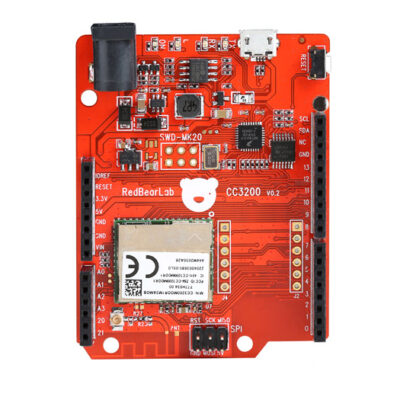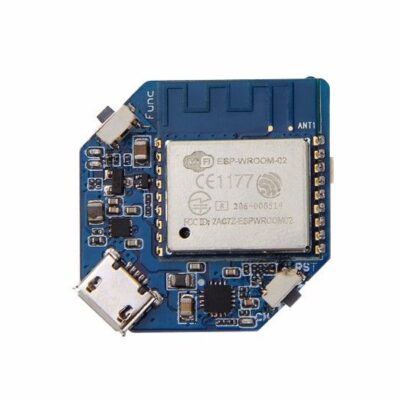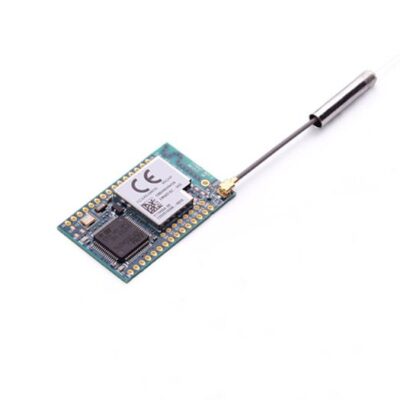01627143179
Add anything you want via XStore Header builder
Add anything you want via XStore Header builder
Menu
Categories
- •Miscellaneous
- •Breakout Boards
- • E Bike Kit
- •Intel
- •Cables
- •Tools
- •Starter Kit
- Home Automation
- •Sensors
- •Case
- •Development Tools
- •Micro Controllers
- >>Exclusive<<<
- •Adapter
- •Displays
- •Prototyping
- •Module
- •Wireless
- •Flying Object
- Arduino
- •Gadgets
- •Components
- PC Accessories
- Raspberry Pi
- •Robotics
- •Grove Products
- •Flight Controller
- •Audio
Wi-Fi Micro
৳ 1,400

The RedBearLab Wi-Fi Micro is made based on CC3200 module by Texas Instruments (TI). The target MCU is TI CC3200, the industry’s first single-chipARM Cortex-M4 core MCU with built-in Wi-Fi connectivity. With on-chip Wi-Fi, Internet, and robust security protocols, no prior Wi-Fi experience is required for faster development. They are offered to make you quickly produce prototypes and demos target for not only Internet of Thing (IoT) but also many other exciting and interesting projects. Such as Wi-Fi camera, Wi-Fi Audio, TFTP Client, TCP/IP OR UDP Server/Client, Http Server, XMPP Client, mDNS, etc.
Features:
- TI CC3200 Dual core MCU: An ARM Cortex-M4 core at 80 MHz for application and a dedicated ARM core for Wi-Fi Network Processing
- Industry’s first sully certified Wi-Fi module including FCC, IC, CE, ETSI, TELEC, and Wi-Fi Alliance
- Easy Wi-Fi setup using TI’S Smart Config, Soft AP or WPS2
- Over the Air (OTA) download application firmware from other Wi-Fi device or Internet
- A lot of application examples provide by TI
- TI-RTOS and Free-RTOS supported
- Wide range of supply voltages and low-power consumption, less than 1uA current in hibernate mode
- IoT Cloud platform integration ready including 2lemetry, Arrayent, Exosite, IBM, Temboo & Xively
- You can program our boards with Arduino like syntax using Energia, an open-sourceed version of the Arduino IDE for TI MCU
This is with MK20 USB board version, if you need it, please visit Wi-Fi Micro.
CC3200 Wi-Fi consists of applications microcontroller, Wi-Fi network processor, and power-management subsystems:
Applications Microcontroller Subsystem
- ARM Cortex-M4 Core at 80 MHz
- 256KB RAM, 1MB serial flash memory with file system for user
- Hardware Crypto Engine for advanced fast security, including AES, DES, 3DES, SHA2 MD5, CRC and Checksum
- Up to 27 individually programmable, multiplexed GPIO pins, including a fast parallel camera interface, I2S, SD/MMC, UART, SPI, I2C, and dour-channel ADC
Wi-Fi Network Processor Subsystem
- Dedicated ARM MCU, completely offloads Wi-Fi and Internet protocols from the applications microcontroller
- 802.11 b/g/n radio
- WPA2 personal and enterprise security
- Station, access point, and Wi-Fi direct modes
- Powerful crypto engine for fast, secure Wi-Fi and internet connections with 256 bit AES encryption for TLS and SSL connections
- SmartConfig technology, AP mode and WPS2 for easy and flexible Wi-Fi provisioning
The power-management subsystem includes integrated DC-DC converters supporting a wide range of supply voltages. This subsystem enables low-power consumption modes, such as the hibernate with RTC mode requiring less than 7uA of current.
Specification:
| Microcontroller | TI CC3200 |
| Operating Voltage | 2.3V to 3.6V |
| Input Voltage |
A: 2.3V – 3.6V
B: 3.3V – 5.5V (VIN)
Cause: Use either one power source at a time, otherwise you will damage the board.
|
| Clock Speed | 80MHz |
| Connectivity |
Wireless LAN (802.11 b/g/n @2.4GHz)
Micro USB (CDC, virtual COM port)
Serial (TX/RX)
I2C
SPI
Parallel Camera
I2S
SD/MMC
|
| Flash Memory | 1MB (External Flash in Module) |
| I/O Pins | 27 |
MK20 USB Board
The MK20 (Freescale MK20DX128VFM5) USB board acts as a dongle, it accepts 5V from USB port and regulates to 3.3V via the onboard LDO which can be used to power BLE Nano. It appears on your computer as both a serial port and a removable mass storage disk. Please refer to the guide Getting Started with BLE Nano to learn how to deploy firmware using MK20 USB board.
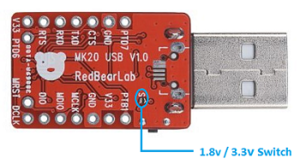
Since the BLE Nano can work as low as 1.8V, we have designed the MK20 USB board to run at 1.8V as well, simple short the switch S, then the regulator will outputs 1.8V instead. This would allow your BLE Nano to work with 1.8V components.
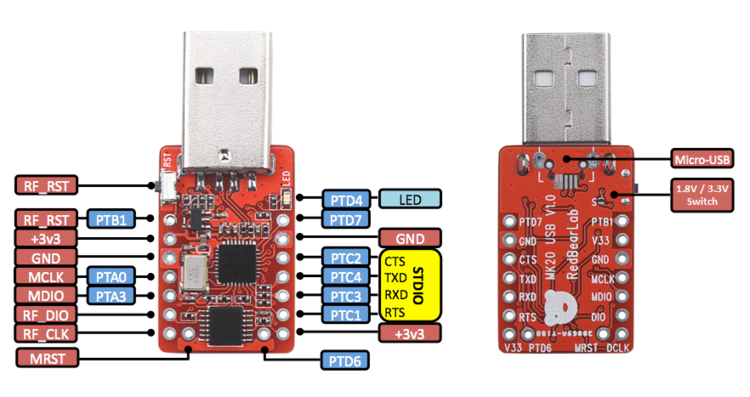
Part List:
- Wi-Fi Micro x 1
- MK20 USB Board x 1
We have prepared a detail guide Getting Started with RedBearLab Wi-Fi Micro to show you how to upload firmware to Wi-Fi Micro using Energia IDE.
For any technical support or suggestion, please kindly go to this forum.









